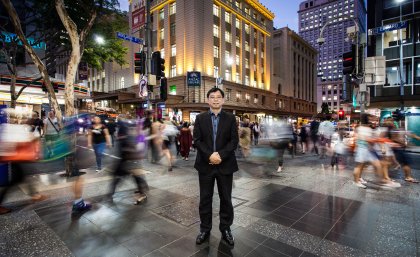
A University of Queensland computer scientist who harvests social media to accurately predict election results says he can confidently call next week’s United States election.
“It’s still Hillary in front, but it’s become much tighter in the past few days,” said Professor Xue Li this morning (Friday, 4 November).
Professor Li predicted the 2013 Australian federal election and the 2015 Queensland election with 95 per cent accuracy.
He is a big data expert in the UQ School of Information Technology and Electrical Engineering, and his election prediction is based on an online search and analysis tool that is updated daily with the previous 24 hours’ social media data.
The online tool is analysing the US election live.
“There are a lot of very angry Americans,” Professor Li said.
“That anger has increased since the news on the FBI re-examining Hillary’s emails.
“Trump is doing better in the south, but unless there is some big negative news about Hillary over the weekend, or a dramatic change in the Trump campaign, our prediction for a Hillary win will hold.”
Professor Li said his data looked at trends and changes “based on sentiment analysis on unique language models that both candidates are using”.
“We provide nationwide and state-wide predictions and show how the forecast has changed,” he said.
“We also do a rates comparison on issues, with the information accumulated using sentiment analysis and ‘deep learning’ algorithms.
“Broadly speaking, ‘deep learning’ feeds data input through multiple processing layers that seek to model high-level abstractions.”
Professor Li’s big data expertise led to his inclusion in the Australian Financial Review’s Power Issue 2015, under the heading Australian computer scientist makes an algorithm that predicts elections.
“The US election is more location-sensitive than the Australian election, as each US state has an independent popular vote for the final electoral vote,” Professor Li said.
“The electoral vote system means US citizens do not directly elect the government – instead they choose electors, who usually pledge to vote for particular candidates.
“So we look at Twitter users who we can identify as being located in a particular US state to calculate a popular vote for each state.”
Professor Li said the analysis divided US election issues into 17 categories: immigration, abortion, guns, foreign policy, taxes, gay marriage, health care, economy and jobs, civil liberties, crime and safety, environment, education, budget and spending, national security, Medicare and social security, veterans, and energy.
“Only tweets related to these categories are considered,” he said.
“In this way, we can get a feeling for the reasons people support certain candidates.”
Professor Li said data science was having an increasing impact on the world.
UQ is offering a Master of Data Science for the first time in 2017.
Media: Professor Xue Li, x.li@uq.edu.au, +61 7 3365 2379, +61 (0)402 796685.









.jpg?itok=isSo-L2d)

